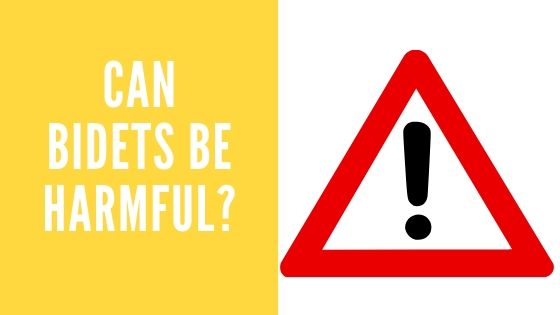Disclosure: Some of the product links on this website may contain affiliate links, which means we may earn money or products from the companies mentioned in this post.
A bidet is a bathroom device that sprays water for the cleansing of your private parts after using the toilet. Bidets vary widely in style and may feature temperature control systems, as well as different water jet patterns and pressure options.
Can a bidet be harmful? According to health experts, bidets are not necessarily harmful or helpful for the average person. However, manufacturers and companies that sell bidets promote the idea that a bidet is healthier than using traditional toilet paper. For instance, according to Tushy retailer’s website, a bidet can help prevent “hemorrhoids, UTIs, general germy stank.” Brondell also claims that bidets can prevent UTIs. Bidet.org adds further ailments on the list. Bidets can help with certain conditions but do have a few health risks for users to be aware of.
In some cultures, people use a bidet during each visit to the restroom. For instance, in some Asian cultures, such as in Korea or Japan, the bidet is very popular. In Europe, the bidet has also long been popular. In other cultures, the bidet is outdated or has never existed. In the United States, bidets seem to be catching on, and, lately, more Americans have started to use them. Using this bathroom appliance may feel cleaner and more comfortable than using traditional toilet paper once the user gets used to the change. But can a bidet be harmful or it is actually healthier?
What are the Potential Negative Side Effects of Using a Bidet?
While the bidet is usually a safe sanitation device, there are some potential medical drawbacks to its use. Repeated bidet use can lead to a variety of health risks which the user should be aware of prior to repeat usage.
Some health studies have found that regular use of bidets may cause some anal pain and damage, especially when narrow water jets are used consistently at high pressure. Mucosal prolapse syndrome, sphincter injury and anal fissure are possible side effects of prolonged use of high-pressure bidet water jets. Keep in mind that most bidets with high pressure allow for a change in pressure for the user’s comfort. To avoid this negative side effect, the user can reduce the pressure or alternate pressure between uses.
It has been also found that, for women, the regular use of a bidet can upset the natural vaginal microflora, leading to bacterial vaginitis. Because of this factor, bidets may be less sanitary than traditional toilet use as the levels of pathogens and bacteria found in bidet users’ vaginal area are actually higher than in those women who do not use bidets.
Bidet usage may also lead to some physical injuries. Severe burning of the perianal and genital areas from hot water jets is possible (although unlikely). Burns are particularly common in older users who may have reduced anal sensitivity to temperature. Some injuries have also been reported from ceramic bidets that break during usage. This can be worrisome for older persons who may develop complications more easily from minor physical injuries.
How to Minimize the Negative Side Effects of Using a Bidet?
Many bidet models feature a high water pressure setting strong enough to penetrate the anus. A bidet water jet set on high-pressure may damage the anal sphincter and mucosa in the long term. In order to avoid irritation of the anus when using a bidet, it is better to use relatively low water pressure settings and warm water rather than hot water. Bidet use poses a potential risk if the temperature of the water jet is too high. Spraying hot water at sensitive areas may cause a scalding burn.
For ladies using a bidet, it is not always recommended to use the vagina wash function. This feature may alter your microflora. Cleaning around your urethra is not recommended, either. While some bidet manufacturers state that this can help reduce UTIs, there is not enough data to support this claim. In fact, according to doctors, if sprayed directly at the urethra, the warm water jet might irritate the area.
Despite these possible negative side effects, there are many ways in which a bidet’s positive benefits will outweigh the negative side effects.
What are the Potential Benefits of Using a Bidet?
Using a bidet has a number of associated potential health benefits. Bidets can provide relief for various health conditions, and in some cases, they can help prevent symptoms or even help treat the condition. Here are some health conditions that bidet use can help:
- Hemorrhoids. Due to the increased bacteria removal, cleaning with water spray after using the toilet could be more hygienic than wiping with toilet paper. For this reason, the bidet is recommended for better hygiene. The extra cleaning may provide a refreshing feel and a more pleasant smell that some bidet users may enjoy.
For some people, good toilet hygiene may be particularly important. For instance, residents of elderly nursing homes who have bidets installed in their facilities tend to report more positive toileting experiences. Read more about sanitary questions here.
Anal pressure can also be effectively reduced by using the bidet. This is important in patients who suffer from hemorrhoids or who have pain or other problems in that area. However, if you have anal fissures or hemorrhoids, it is recommended to first check with your physician regarding whether or not the bidet use can help or harm your medical condition.
- Anal Fissure. A bidet can be beneficial for people suffering from an anal fissure. Using dry toilet paper for wiping after a visit to the restroom can lead to infection because of the potential of missing bacteria, and it can also be painful for people who have an anal fissure. A bidet flushes any residue away using clean water. The water will also help irritated tissue to feel better and to soothe any discomfort.
- Rectal Prolapse. People suffering from rectal prolapse can also benefit from using a bidet. Depending on the individual, rectal prolapse can be mild or it can be a more serious condition. A rectal prolapse means the rectum wall has slid out of its place. The rectum may even protrude from the anus in more severe cases. In such a case, a bidet can fully wash away the fecal matter and unwanted bacteria, helping the user to keep the anal region clean. This may prevent infection of the anus and the digestive tract. A bidet can also minimize discomfort and soothe any inflamed tissues.
- Anal Itching. Anal itching is another very common problem. There are many causes for this, including an infection in your rectum or anus, certain foods, cancer, skin sensitivity, frequent diarrhea, and moisture in the rectal area. There are several ways using a bidet may relieve anal itching. The water can help the tissues feel better when the itching is caused by rectum or anus inflammation. Water can be soothing and staying clean makes you less itchy and less prone to scratching. The warm water can also help with irritation or swelling that may be aggravating your condition.
- Gastrointestinal Disorders. Anyone who suffers from a gastrointestinal disorder causing frequent bowel movements, such as Chron’s disease, irritable bowel syndrome, or inflammatory bowel disease, might benefit from using a bidet because water is one of the healthiest and best ways to clean this area, and bidets provide a natural and comfortable process for use.
Wiping off with dry toilet paper in case of frequent toilet use can be irritating. Also, according to health experts, of all our body parts, our hands are hosts of the most germs. Since bidets can be used handsfree, this may help you to spread fewer germs after going to the bathroom.
- Decreased Mobility. If you have a decreased mobility or range of motion due to an injury or pregnancy, then it can be difficult reaching to wipe. Or, if you gave birth recently and are still in pain, it could be very practical to just use a bidet. This device offers a cleansing mechanism that is particularly useful to this subsection of the population.
- Additional Benefits:
Environmental Benefits. Bidet usage provides, in addition, a significant environmental benefit. A reduction in toilet paper use leads to a decrease in overall waste produced as well as a reduction in trees cut for manufacturing the paper. Further, overall water and energy used to process and disintegrate used toilet paper are decreased. This also leads to fewer issues with clogged toilets and small financial savings as you no longer have to buy toilet paper.
Portable Bidet Seat Attachments. If space is a concern, then portable bidets are a convenient option. They do not take up any extra space as they attach to your toilet. Users of portable bidets do not even need to leave the toilet seat and can quickly wash. They can also be taken wherever you need to go, as they come in a discreet and convenient carrying bag. Of course, using your portable bidet also helps you to avoid the awkward situation of there being no toilet paper left at a public toilet.
While there are a variety of benefits and potential health risks to using a bidet, it is important for the user to make an informed decision before use. Consider the factors listed in this article, and feel free to discuss with your doctor if using a bidet might be beneficial for you.

